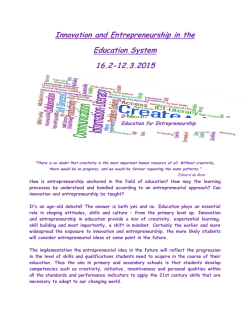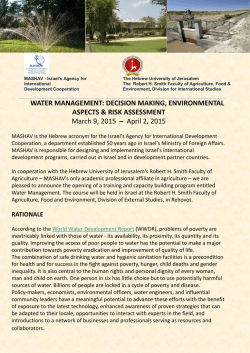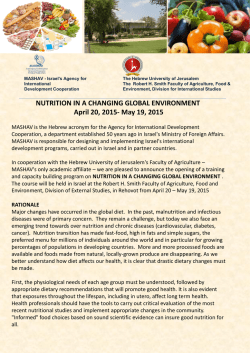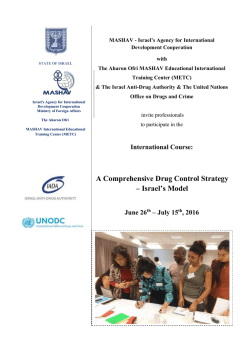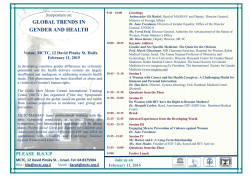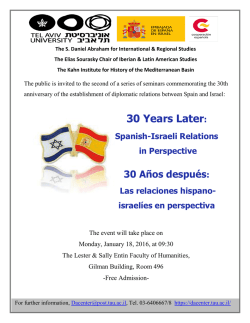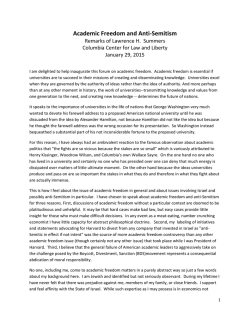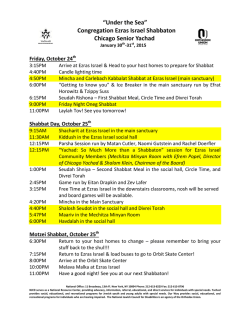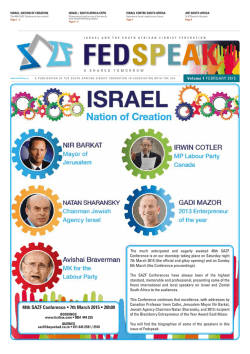
International Course: May 30th – June 23rd, 2016
MASHAV - Israel’s Agency for International Development Cooperation with The Weitz Center for Sustainable Development invite professionals to participate in the STATE OF ISRAEL International Course: “Clean Technologies – Environmental technology, innovation and management systems as a means for regional and local economic development” Israel's Agency for International Development Cooperation Ministry of Foreign Affairs לוגו שלוחה The Weitz Center for Sustainable Development May 30th – June 23rd, 2016 About the Course Background Clean Technology is commonly defined as a diverse range of products, services, and processes that harness renewable materials and energy sources, dramatically reduce the use of natural resources, and cut or eliminate emissions and wastes. Clean Technology includes a wide variety of environmental, social and economic activities predominantly comprising the fields of: clean production including green chemistry, resource efficiency including energy efficiency, renewable energy, information technology, green transportation, sustainable water technologies and green building. Investments in clean technology have grown considerably since coming into the spotlight around the year 2000. For example, the markets for clean energy technologies grew from less than $7 billion in 2001 to over $188 billion in 2010. This staggering increase is a result of the growing constraints on conventional economic growth due to environmental degradation, high oil prices, scarcity of natural resources and climate change. Therefore, some regard Cleantech as the beginning of a revolution that is changing the places where we live and work, the products we manufacture and purchase, and the development plans of cities, regional governments, and nations around the globe. Many clean technologies also offer significant additional benefits, notably their ability to improve the lives of those in both developed and developing countries. Communities can be connected to electricity without the need to build a complex national grid, waste can be collected and turned into energy, and water can be purified to provide safe drinking water. Therefore, the realization of clean technology is twofold: technologies and implementation - utilizing a better understanding of socio-economic factors in the move towards sustainable development. The international training Clean Technologies – Environmental technology, innovation and management systems as means for regional and local economic development will emphasize for participants the importance of this two-pronged approach to the realization of clean technology, introduce and review a variety of clean technologies and illustrate implementation mechanisms such as: supportive policy and legislation, advocacy and promotion, the value of regional and international networks and the role of business development and entrepreneurship. The Israeli Experience Israel is a small, densely populated country with few natural resources. As such, Israel developed novel technologies for conservation, resource management and implementation mechanisms. Israel excels in innovative ideas and patents on new technologies. A recent international report by The World Wildlife Fund and the Cleantech Group (an environmental consulting company) ranked Israel second in providing favorable conditions for cleantech development. International Collaboration: RECPnet The Weitz Center proudly belongs to the prestigious joint UNIDO-UNEP initiative RECPnet: the Global Network for Resource Efficient and Cleaner Production - http://recpnet.org/. The Methodology Participants will participate in both classroom-based lectures (soft and hard skills) and study visits, benefiting from the experience and knowledge of high-level Israeli experts and consultants. Israeli case studies and practices will be discussed throughout the program. Additionally, participants will be required to formulate and present a project of interest relevant to the topic of this course. For this purpose, some pre-course work will be required. Detailed instructions will be sent to the selected participants. 2 Aims The course aims to: Provide participants with knowledge, tools and strategies related to clean technologies Inspire and energize participants to be agents for positive change in their countries Expose participants to new approaches and opportunities in the field of clean technology Present Israel as a case study from which to draw valuable lessons about clean technology Enrich participants with professional skills with which to develop their careers and best benefit their communities and countries Connect participants with an international network of professionals in their field Main Subjects The program will provide participants with knowledge and tools in the following subjects: Policies and national programs for cleantech development Law and regulation implementation for renewable energy , energy efficiency and water conservation Advocacy for and promotion of cleantech Platforms, networks and cooperation for new technology implementation at the regional level Innovation support systems, SME and entrepreneurship support for cleantech development The Israeli experience and Israeli cleantech startups and companies in water technologies, energy technologies, waste management, recycling and waste to energy programs Application Application Requirements Who may apply? The training targets highly motivated decision makers, policy makers and professionals from the fields of energy, water, waste, agriculture, climate change, infrastructure and economic development, those working in government ministries (such as local government, planning, development, energy and others), in local authorities, NGO’s and CBO’s active in the field of entrepreneurship and startup, venture capital funds, business organizations, and academic institutions engaged with cleantech and entrepreneurship programs. Application Process Candidates must complete the appropriate application forms (including health certificate, declaration etc.) available at the Israeli diplomatic mission in their country, or through the Internet http://mashav.mfa.gov.il, www.weitz-center.org. The completed forms should be submitted in WORD documents to the Israeli mission in your area and sent to our office ([email protected]) no later than the morning of April 1st, 2016. Candidates must also hand in a passport photo by electronic file. Application forms Application forms and other information may be obtained at the nearest Israeli mission or at MASHAV’s website: http://mashav.mfa.gov.il/MFA/mashav/Courses/Pages/default.aspx. Completed application forms, including the medical form, should be sent to the relevant Israeli mission in the respective country. General Information Arrival and Departure Arrival date: 29-30.05.2016 Opening date: 30.05.2016 Closing date: 22.06.2016 Departure date: 23.06.2016 3 Participants must arrive at the training center on the arrival date, and leave on the departure date. Early arrivals/late departures if required, must be arranged by the participants themselves, directly with the hotel/center, and must be paid for by the participant him/herself. Location and Accommodation MASHAV awards a limited number of scholarships. The scholarship covers the cost of the training program including lectures and field visits, full board accommodation in double rooms (two participants per room), health insurance (see below) and transfers to and from the airport. Airfares and daily allowance are not included in the scholarship. Health Services Medical insurance covers medical services and hospitalization in case of emergency. It does not cover the treatment of chronic or serious diseases, specific medications taken by the participant on a regular basis, dental care and eyeglasses. Health authorities recommend that visitors to Israel make sure they have been inoculated against tetanus in the last ten years. Subject to the full binding policy conditions. Participants are responsible for all other expenses. The course will be held at The Weitz Center for Sustainable Development, situated within the campus of the Faculty of Agriculture, Rehovot, Israel. Participants will be accommodated at the Reisfeld Residence in single rooms in shared apartments (4-5 participants per apartment). About MASHAV MASHAV – Israel’s Agency for International Development Cooperation is dedicated to providing developing countries with the best of Israel’s experience in development and planning. As a member of the family of nations, The State of Israel is committed to fulfilling its responsibility to contribute to the fight against poverty and to the global efforts to achieve sustainable development. MASHAV, representing Israel and its people, focuses its efforts on capacity building, sharing relevant expertise accumulated during Israel's own development experience to empower governments, communities and individuals to improve their own lives. MASHAV’s approach is to ensure social, economic and environmental sustainable development, and is taking active part in the international community’s process of shaping the Post-2015 Agenda, to define the new set of the global Sustainable Development Goals (SDGs). MASHAV’s activities focus primarily on areas in which Israel has a competitive advantage, including agriculture and rural development; water resources management; entrepreneurship and innovation; community development; medicine and public health, empowerment of women and education. Professional programs are based on a “train the trainers” approach to institutional and human capacity building, and are conducted both in Israel and abroad. Project development is supported by the seconding of short and long-term experts, as well as on-site interventions. Since its establishment, MASHAV has promoted the centrality of human resource enrichment and institutional capacity building in the development process – an approach which has attained global consensus. http://mashav.mfa.gov.il https://www.facebook.com/MASHAVisrael About The Weitz Center for Sustainable Development The Weitz Center for Sustainable Development is a leader in capacity building for sustainable development. Our work is dedicated to enhancing the efforts of international agencies, governments, communities, civil society and private sector organizations to achieve positive social and economic change worldwide. Towards this end, we offer high quality training and consulting services, highlighting our practical, assetsbased and integrated approach to development. http://www.weitz-center.org/ 4 For further information, please contact: Weitz Center for Sustainable Development Address: P.O. Box 12, Rehovot 7610001, Israel Tel: 972-8-9474111 Fax: 972-8-9475884 Email: [email protected] Website: http://www.weitz-center.org/ 5
© Copyright 2026
